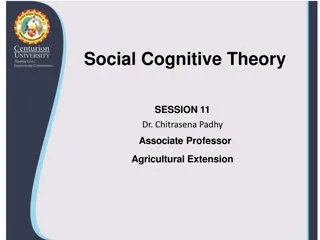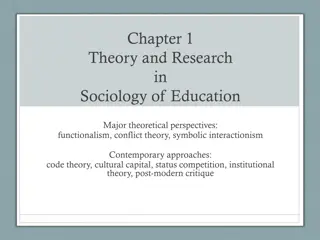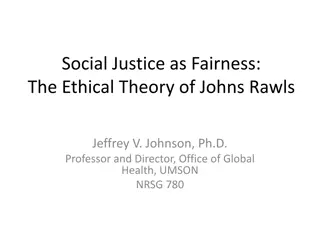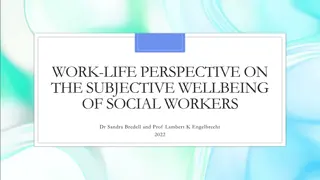Social Balance Theory and Network Interactions
Explore social balance theory and its application in network interactions, based on chapters 10 and 11 of "Networks, Crowds, and Markets" by D. Easley and J. Kleinberg. Learn about global balance index, exchange cost, social power, network building algorithm, random and scale-free networks, matching
3 views • 27 slides
Understanding Social Learning Theory and the Power of Example
Social Learning Theory, introduced by Bandura, emphasizes learning through observation and modeling. It explores how individuals acquire behavioral dispositions, trial-and-error experiences, and the impact of stimuli in the environment. The theory focuses on the importance of attention, retention, a
1 views • 17 slides
Understanding Social Entrepreneurship, Social Enterprise, and Social Innovation
Social entrepreneurship involves creating sustainable social impact, social enterprises address challenges in critical needs sectors, and social innovation focuses on developing effective solutions to social and environmental issues. These concepts emphasize creating social value while engaging with
2 views • 19 slides
Evolution of Mathematical Theories and Proof Systems
Development of mathematical theories such as model theory, proof theory, set theory, recursion theory, and computational complexity is discussed, starting from historical perspectives with Dedekind and Peano to Godel's theorems, recursion theory's golden age in the 1930s, and advancements in proof t
1 views • 29 slides
Psychological Theories of Criminality: Understanding the Roots
Psychological theories of criminality delve into the association between intelligence, personality, learning, and criminal behavior. Major theories include Psychodynamic Theory by Freud, Behavioral Theory by Bandura, and Cognitive Theory by Kohlberg. These theories explore how unconscious mental pro
1 views • 20 slides
Understanding Off-Balance Sheet Items in Banking Activities
Off-balance sheet items refer to activities that are assets or liabilities of a company but do not appear on the balance sheet. In banking, these can include loans given to borrowers, securitization, guarantees, and other contingent facilities. Learn more about how off-balance sheet exposures impact
0 views • 6 slides
Understanding the Theory of Firms: Neoclassical vs. Modern Approaches
The theory of firms is explored through the Neoclassical and Modern perspectives. Neoclassical theory focuses on profit maximization, while Modern theory delves into managerial, principal-agent, and transaction cost theories. The discussion covers criticisms of Neoclassical theory and the essential
1 views • 79 slides
Understanding Medical Social Work and Its Impact on Patient Well-being
Medical Social Work, also known as Health Care Social Work, plays a crucial role in addressing the social, physical, and psychological needs of patients. Through providing case work, after-care, and convalescence services, Medical Social Workers contribute to reducing hospital readmissions, preventi
0 views • 12 slides
Theories of Causation in Psychological and Social Sciences
Overview of theories of causation categorized into psychological, social psychological, and sociological perspectives. Psychological theories focus on instinctive, biological, and psychological qualities of abusers, including Attachment Theory, Psychodynamic Theory, Social Learning Theory, and Situa
0 views • 15 slides
Understanding Political Theory through a Contextual Approach
Exploring G.H. Sabine's perspective on political theory through a contextual approach, emphasizing the importance of historical context and societal influences. Sabine argues that while political theory evolves with its contemporary politics, it should be analyzed within its specific time and social
0 views • 9 slides
Understanding Balance of Power Theory in Global Politics
Balance of Power Theory in global politics emphasizes the distribution of military capability among states to prevent hegemony and maintain national security. It is a realist theory that highlights the importance of preventing any single state from dominating others. The theory discusses how stronge
1 views • 15 slides
Objectives and Importance of Social Legislation for Social Workers
Social legislation is inspired by the constitution and aims to remove discrimination, safeguard rights of vulnerable groups, and eradicate social evils. It plays a crucial role in social welfare by providing a legal basis for addressing societal issues, enhancing community well-being, and facilitati
0 views • 4 slides
Evolution of Light Theory: From Wave Theory to Quantum Theory
At the turn of the century, the discovery of the photoelectric effect challenged the wave theory of light, leading to the development of the quantum theory by Max Planck and Albert Einstein. This new theory introduced the concept of discrete energy units known as quanta, bridging the gap between wav
1 views • 62 slides
Understanding Social Cognitive Theory: Insights from Albert Bandura
Social Cognitive Theory, developed by Albert Bandura, emphasizes learning through observation and modeling behaviors. The theory explores how individuals acquire new behaviors, thoughts, and attitudes by observing others. Bandura's famous Bobo doll experiment showcased how children imitated aggressi
6 views • 17 slides
Theoretical Perspectives in Sociology of Education
Exploring major theoretical perspectives such as functionalism, conflict theory, and symbolic interactionism along with contemporary approaches like code theory, cultural capital, and status competition. The functionalist theory emphasizes social cohesion and maintaining social order through educati
3 views • 14 slides
Understanding the Urinary System: Kidneys, Functions, and Structure
The urinary system, also known as the renal system, consists of the kidneys, ureters, bladder, and urethra. Each kidney contains nephrons, the functional units responsible for filtering waste and regulating blood volume, pressure, electrolytes, and pH balance. The kidneys have an extensive blood sup
0 views • 35 slides
Role of Major Physiological Anions in the Human Body
Physiological anions such as chlorides, sulphates, bicarbonate, phosphates, and electrolytes play essential roles in maintaining various functions within the body. Chloride ions help in osmotic balance, charge balance, and acid-base balance. Sulphates are important for detoxification mechanisms and
0 views • 11 slides
Dp-branes, NS5-branes, U-duality, and M-Theory Overview
Overview of Dp-branes, NS5-branes, and U-duality derived from nonabelian (2,0) theory with Lie 3-algebra. Introduction to M-theory, including M2-branes and M5-branes in the strong coupling limit. Discussion on BLG theory, Lorentzian Lie 3-algebra, and the ABJM theory for M2-branes.
1 views • 32 slides
Understanding Water and Electrolyte Balance in the Human Body
The body's fluid compartments, including intracellular and extracellular fluids, play a crucial role in maintaining water and electrolyte balance. This balance is regulated by movements of water and electrolytes between compartments, influenced by factors like hydrostatic and osmotic pressures. Main
2 views • 18 slides
Understanding Fund Balance in School Finance
Explore the concept of fund balance in school finance through examples from Bozeman Schools. Learn how beginning balance, revenues, and expenditures affect the ending fund balance, with a system designed to maintain reserves. Delve into budgeting and actual expenditure scenarios to better comprehend
0 views • 24 slides
Local Government Finance Overview - Fiscal Year 2024/2025 Budget Insights
Explore the Fiscal Year 2024/2025 Budget details including Fund Balance, Revenue sources, Importance of a Strong Fund Balance, Fund Balance Policies, various Funds available, Revenues breakdown by types, and Actuals data for the year 2022/2023. Understand the significance of maintaining a strong Fun
0 views • 27 slides
Understanding Time-Independent Perturbation Theory in Quantum Mechanics
Perturbation theory is a powerful tool in solving complex physical and mathematical problems approximately by adjusting solutions from a related problem with known solutions. This theory allows for more accurate approximate solutions by treating the difference as a small perturbation. An example inv
0 views • 19 slides
Understanding Posture, Balance, and Gait Analysis in Human Movement
This resource delves into the static assessment of posture and balance, exploring the various inputs and control mechanisms involved in maintaining standing posture. It discusses the key factors influencing posture, such as visual, somatosensory, proprioceptive, and vestibular systems, along with mu
0 views • 51 slides
Ethical Theories: Divine Command vs. Virtue Theory Explained
Divine Command Theory asserts that morality is derived from God's commands, contrasting with Virtue Theory which focuses on developing moral virtues to achieve human flourishing and excellence. Divine Command Theory relies on religious texts, while Virtue Theory emphasizes the cultivation of virtues
0 views • 24 slides
Understanding Affect Control Theory in Social Science: A Primer
Affect Control Theory explores how individuals maintain an orderly society through repeated actions. This primer delves into the theory's elements, the intellectual terrain of the 1960s, addressing questions on societal order, and the control principle. It also highlights the theory's scope conditio
0 views • 40 slides
Understanding Balance of Payment (BOP) and Its Components
Balance of Payments (BOP) is a crucial accounting record detailing a country's economic transactions with the rest of the world. It encompasses exports, imports, financial transfers, and more. The BOP consists of the Current Account Balance, Capital Account Balance, and Overall BOP, reflecting the f
0 views • 17 slides
Understanding Fermi Liquid Theory in Interacting Fermion Systems
Fermi liquid theory, also known as Landau-Fermi liquid theory, is a theoretical model that describes the normal state of metals at low temperatures. Introduced by Landau and further developed by Abrikosov and Khalatnikov, this theory explains the similarities and differences between interacting ferm
0 views • 23 slides
Understanding Balance of Power in 18th Century Europe
Balance of power in 18th-century Europe was a concept where great powers aimed to maintain equilibrium to prevent one nation from becoming too powerful. This balance was evident in events like the War of the Austrian Succession and the Diplomatic Revolution of 1756, which reshaped alliances and riva
0 views • 13 slides
Understanding Social Issues through Theory and Perspectives
Social theory is a system of interconnected ideas that organizes knowledge about the social world. It helps us analyze social problems like social pathology, disorganization, conflicts in values, and deviant behaviors. Differentiating theory, perspective, and model, it's key to note that theories pr
0 views • 37 slides
Computational Learning Theory: An Overview
Computational Learning Theory explores inductive learning algorithms that generate hypotheses from training sets, emphasizing the uncertainty of generalization. The theory introduces probabilities to measure correctness and certainty, addressing challenges in learning hidden concepts. Through exampl
0 views • 43 slides
Automata Theory and Theory of Computation Overview
This course overview covers concepts in automata theory and theory of computation, including formal language classes, grammars, recognizers, theorems in automata theory, decidability, and intractability of computational problems. The Chomsky hierarchy, interplay between computing components, modern-
0 views • 42 slides
Understanding Social Neuroscience: Exploring Human Sociality and Well-Being
Social neuroscience delves into how the brain processes social interactions and their impact on human well-being. It focuses on the interconnectedness between social connections and overall life satisfaction, suggesting that humans are inherently social beings with a strong need for social belonging
2 views • 21 slides
Social Entrepreneurship and Social Inclusion in Bulgaria
The development and implementation of social entrepreneurship practices in Bulgaria aim to promote social inclusion through the development of the social economy. The focus is on combining economic results with social objectives, managed transparently with measurable, positive financial value. Vario
2 views • 12 slides
Theories of Interest in Microeconomics II
Explore various theories of interest in economics, including the Classical Theory, Liquidity Preference Theory by Keynes, Productivity Theory, Abstinence Theory, Time-Preference Theory, Fisher's Time Preference Theory, and the Loanable Fund Theory. These theories offer different perspectives on the
0 views • 6 slides
Exploring the Evolution of Atomic Theory
Delve into the historical journey of atomic theory starting from Democritus and Aristotle's views to modern advancements proving some aspects of Dalton's theory incorrect. Learn about key laws and theories such as the Particle Theory of Matter, Dalton's Atomic Theory, and JJ Thomson's discoveries, s
0 views • 30 slides
Social Justice as Fairness: The Theory of John Rawls
John Rawls' theory of justice focuses on addressing the inequalities in life prospects stemming from social starting positions. He argues that the basic structure of society must be the subject of justice regulation as it profoundly impacts individuals from the outset. Rawls emphasizes that social j
0 views • 10 slides
Understanding Earth's Energy Balance and Temperature Variations
Earth's energy balance is crucial for maintaining atmospheric temperature and regulating daily and seasonal temperature changes. The net radiation, consisting of incoming shortwave and outgoing longwave radiation, plays a key role in this balance. Components such as sensible heat flux, latent heat o
0 views • 18 slides
Macromechanical Analysis of Lamina and Tsai-Hill Failure Theory Overview
The Tsai-Hill failure theory is based on the strengths of a unidirectional lamina, incorporating longitudinal and transverse tensile and compressive strengths, as well as in-plane shear strength. This theory, derived from the distortion energy theory, provides criteria for determining lamina failure
0 views • 15 slides
Understanding Subjective Wellbeing of Social Workers in South Africa
Gain insights into the subjective wellbeing of social workers in South Africa within the context of work-life balance. Explore perceptions of work-life balance and subjective wellbeing, aiming to provide recommendations for improving the overall wellbeing of social workers. The study uses theoretica
0 views • 24 slides
Understanding Social Impact Theory Through Sedikides and Jackson (1990) Study
Explore Sedikides and Jackson's study on social impact theory, focusing on the variables manipulated and measured, along with their findings regarding Social Impact Number (SIN). Evaluate the study's support for the theory and its implications on factors like strength, immediacy, and number in socia
0 views • 18 slides







































